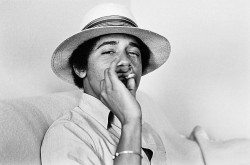
“How did I anticipate this question?” President Barack Obama jokes when asked about US marijuana policy while in Jamaica. The person posing the question mentioned that cannabis and hemp provided economic opportunities for Jamaica. After his initial joking, President Obama mentioned that two states had already implemented marijuana legalization and that positive results in future states would “spur on a national debate, but that is going to be some time off.” Excuse me, Mr. President, but the national debate is here and now and unfortunately, you seem to be ducking the issue, when you should be showing true leadership.
The legalization of cannabis is a question that has been repeatedly posed to President Obama, particularly by young Americans. In a recent VICE News interview with the President, Obama was again asked on his views about legal marijuana by VICE CEO Shane Smith. His thoughts? “It shouldn’t be young people’s biggest priority. Let’s put it in perspective: Young people, I understand this is important to you, but you should be thinking about climate change, the economy, jobs, war and peace. Maybe way at the bottom you should be thinking about marijuana.”
You’ve gotta hand it to the President, as someone who owes his two terms in the Oval Office to the youth vote, he’s masterful at shutting down their most frequently asked questions about federal drug policy. As you may recall, back in 2009 the President held an online town hall Q&A session: citizens were asked to vote on questions that the President would then answer, in the first Internet-facilitated townhall of its kind. Over 193,000 people submitted questions, more than 3.5 million people voted on these questions, and of the first 200 highest rated questions, 198 had to do with drug policy. Instead of taking the opportunity to address our nation’s failed drug policy and answer these questions seriously , the President took this opportunity to crack a joke. “I have to say that there was one question that was voted on that ranked fairly high, and that was whether legalizing marijuana would improve the economy and job creation – I don’t know what this says about the online audience [cue laughter] – but…this was a fairly popular question, we wanted to make sure it was answered. The answer is no, I don’t think that is a good strategy to grow our economy.”
What legalization in Colorado and Washington have shown, is that YES, legalization is a good strategy to grow our economy. Thousands of jobs have been created in the first two states to legalize marijuana, and this growth is forecasted to continue in Oregon, and Alaska, the first four states to legalize marijuana. These jobs mean more people paying taxes, and the taxes that are levied on growers, retailers and consumers are new sources of revenue that are going into the system and not into underground markets that could fund cartels and other criminal enterprises.
Young people are thinking about the economy, about jobs, about climate change and about war and peace. The criminalization of a plant that has never killed a single human being as a result of its use and the policy of prohibition that stems primarily from racism in the 1930’s is hurting the younger generation, which is why these questions are consistently asked.
Legalization of marijuana would create jobs, does create jobs – it allows for tax dollars to go to schools, roads, and government projects. Hemp production would allow us to create sustainable biofuels, plastics, food, and even building materials, allowing us to fight against climate change by replacing or supplementing the fossil fuels we currently rely on.
War and peace? The War on Drugs hits us closer to home, 1.5 million people were arrested for non-violent drug offenses in 2013, not to mention the the turmoil and violence that prohibition has caused our southern neighbor, border, and states.
And yet, despite all of the benefits of ending prohibition, President Obama continues to ignore marijuana and hemp legalization as legitimate policy choices. When he, of all people, as a former Choom Gang member, should understand just how lucky he is that a marijuana arrest didn’t derail his future. If he would have been unlucky enough to be arrested, he could have experienced 8 years in the big house instead of the White House. Maybe, President Obama, it’s you and not the young people (to whom you owe your stay in the White House in the first place), who has their priorities out of order.






